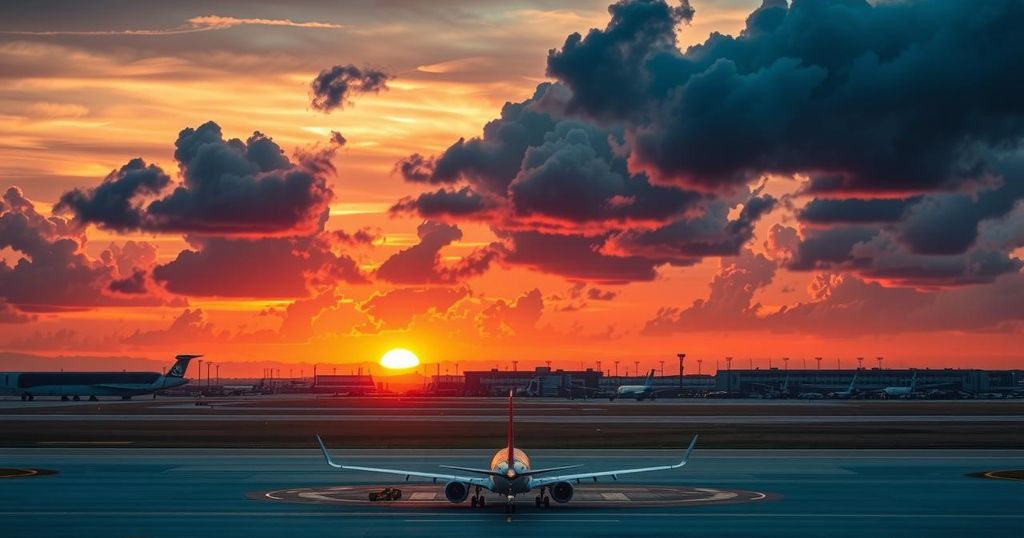Chad condemned threats by Sudan’s Lt-Gen Yasir al-Atta as a “declaration of war” following accusations of UAE arms delivery to the RSF. Chad’s foreign ministry emphasized a response under international law if its territory is threatened. Amid the ongoing Sudanese civil war, the RSF claimed new territorial gains, worsening the humanitarian crisis and spotlighting regional tensions.
Chad has condemned remarks made by Lt-Gen Yasir al-Atta, Sudan’s deputy army commander, threatening to attack Chadian airports, labeling it a “declaration of war.” Chad’s foreign ministry indicated it will respond to any encroachment as per international law. These comments arise amid allegations that the UAE is using Chad’s airports to deliver arms to Sudan’s paramilitary Rapid Support Forces (RSF) amid ongoing civil unrest in Sudan.
The Sudanese military, engaged in a civil conflict for two years, continues to accuse the UAE of providing support to the RSF. Allegations of the UAE smuggling weapons through Chad have been characterized as “credible” by UN experts, although the UAE firmly denies these claims. The tensions intensified after Sudan decided to take the UAE to the International Court of Justice (ICJ) for its purported backing of the RSF.
At a recent event commemorating a Sudanese officer killed in an RSF drone strike, Lt-Gen Atta described airports in Chad’s capital, N’Djamena, and Amdjarass as legitimate targets, indicating possible military retaliation against both Chad and the UAE. He specifically mentioned that retaliatory actions may extend to South Sudan and Chad’s President Mahamat Déby, while South Sudan has denied offering any support in the conflict.
Chad’s government dismissed the threats from the Sudanese general as frivolous, calling for a ceasefire and constructive dialogue for peace. Chad has maintained neutrality but hosts a significant number of Sudanese refugees escaping conflict, particularly from Darfur, under RSF control, thus highlighting its regional humanitarian responsibilities.
In recent developments, the RSF claimed to have captured al-Malha in Darfur, a critical area linking trade routes from Chad and Libya. This location also serves as crucial for reaching el-Fasher, which remains under army control, besieged by the RSF. The RSF reported high casualties among the coalition forces opposing them and claimed to have “liberated” the territory, asserting their dedication to ending the war for the benefit of the Sudanese people.
Local activists have reported dire conditions in al-Malha, with RSF intervention resulting in road blockades and humanitarian crises. Reports indicate that local institutions are non-functional, leading to desperate needs for food and water among displaced residents. The RSF has reportedly targeted the Zaghawa community and destroyed homes of those with military connections, further intensifying ethnic tensions.
Analysts observe that the RSF is reinforcing control over Darfur as the Sudanese army makes significant advances in central Sudan. Gen Mohamed Hamdan Dagalo, leader of the RSF, remains committed to continuing the fight in Khartoum despite significant territorial losses. The Sudanese army has been reclaiming key areas and facilities in the capital, potentially shifting the conflict’s dynamics toward a risk of de-facto partitioning between the factions involved.
Chad’s swift condemnation of the threats from Sudan’s army highlights escalating geopolitical tensions in the region. With allegations of arms smuggling by the UAE emerging and local conflicts intensifying, the humanitarian crisis deepens. The RSF’s actions signify its strategic aims in Darfur while the Sudanese army seeks to reclaim and consolidate control in Khartoum. As both sides dig in, the risk of regional instability remains severe, necessitating urgent international attention and intervention.
Original Source: www.bbc.com






